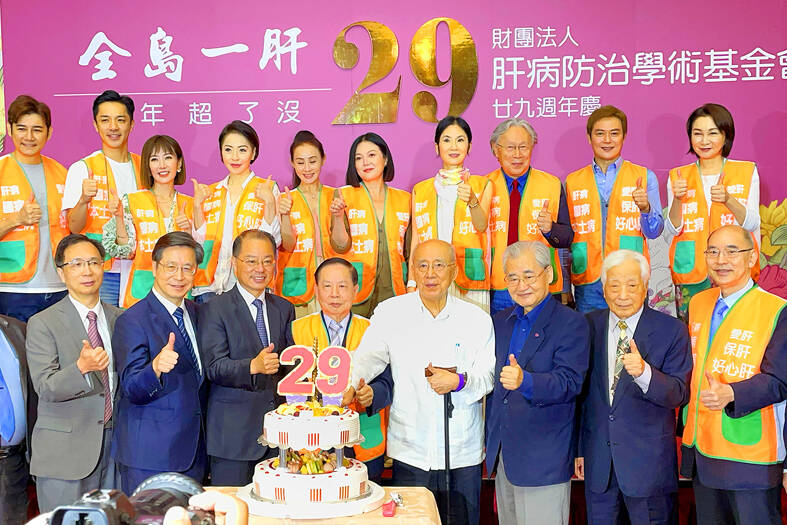People aged 40 or older should undergo at least one abdominal ultrasound scan per year, the Liver Disease Prevention and Treatment Research Foundation said yesterday, on its 29th anniversary.
Foundation chairperson Hsu Ching-chuan (許金川) said at an event in Taipei that since the foundation was established in 1994, it has been devoted to preventing liver disease and ending the notion that liver disease is Taiwan’s “national disease.”
Chronic liver disease and cirrhosis are no longer among the 10 leading causes of death in Taiwan, but about 12,000 people still die of liver disease each year, including about 7,000 due to liver cancer and about 5,000 due to cirrhosis, Hsu said.

Photo: Chiu Chih-jou, Taipei Times
The liver has no pain receptors, so when people seek medical attention after symptoms emerge, it is often too late, he said.
People aged 40 or older should undergo an abdominal ultrasound scan at least once per year to detect abnormalities and get early treatment, he added.
The foundation in 2021 launched a program for abdominal ultrasound scans to be conducted at 12 hospitals to promote liver disease awareness, Hsu said.
Last month the program was expanded to 24 hospitals across the nation, including on outlying counties, he said.
Health Promotion Administration Director-General Wu Chao-chun (吳昭軍) told the event that WHO member states have committed to eliminating viral hepatitis by 2030, while Taiwan aims to eliminate hepatitis C by 2025 and hepatitis B by 2030.
As of May, about 181,000 people had been treated for hepatitis C this year, but there are an estimated 51,000 people with the disease that have not had it diagnosed, Wu said.
A program launched in 2020 offering people aged 45 or older free testing for hepatitis B and C infection has had about 5 million participants, he said.
The event was also attended by former Chinese Nationalist Party (KMT) chairman Wu Poh-hsiung (吳伯雄), Taipei Deputy Mayor Lee Shu-chuan (李四川), National Taiwan University (NTU) vice president Chang Shan-chwen (張上淳), NTU Hospital superintendent Ni Yen-hsuan (倪衍玄) and other public figures, as well as people who have received a liver transplant.
Retired nurse Wu Wan-yu (吳琬玉) also spoke at the event.
She was photographed administering a hepatitis B vaccine to a baby, with the image published on the cover of a government health promotion magazine in July 1984, when the government launched its program to vaccinate children born to mothers who are carriers of the hepatitis B virus.
Wu Wan-yu said that she was 24 and working at a hospital in Taichung when the photo was taken.
At the time, she did not know that the vaccine was so important, she said.
However, the efforts of the government and experts in Taiwan have significantly reduced mother-to-child transmission of hepatitis B for the past 40 years, she said.

“China is preparing to invade Taiwan,” Deputy Minister of Foreign Affairs Francois Wu (吳志中) said in an exclusive interview with British media channel Sky News for a special report titled, “Is Taiwan ready for a Chinese invasion?” the Ministry of Foreign Affairs said today in a statement. The 25-minute-long special report by Helen Ann-Smith released yesterday saw Sky News travel to Penghu, Taoyuan and Taipei to discuss the possibility of a Chinese invasion and how Taiwan is preparing for an attack. The film observed emergency response drills, interviewed baseball fans at the Taipei Dome on their views of US President

The Central Weather Administration (CWA) today issued a "tsunami watch" alert after a magnitude 8.7 earthquake struck off the Kamchatka Peninsula in northeastern Russia earlier in the morning. The quake struck off the east coast of the Kamchatka Peninsula at 7:25am (Taiwan time) at a depth of about 19km, the CWA said, citing figures from the Pacific Tsunami Warning Center. The CWA's Seismological Center said preliminary assessments indicate that a tsunami could reach Taiwan's coastal areas by 1:18pm today. The CWA urged residents along the coast to stay alert and take necessary precautions as waves as high as 1m could hit the southeastern

ECONOMIC BENEFITS: The imports from Belize would replace those from Honduras, whose shrimp exports have dropped 67 percent since cutting ties in 2023 Maintaining ties with Taiwan has economic benefits, Ministry of Foreign Affairs officials said yesterday, citing the approval of frozen whiteleg shrimp imports from Belize by the Food and Drug Administration (FDA) as an example. The FDA on Wednesday approved the tariff-free imports from Belize after the whiteleg shrimp passed the Systematic Inspection of Imported Food, which would continue to boost mutual trade, the ministry said. Taiwan’s annual consumption of whiteleg shrimps stands at 30,000 tonnes, far exceeding domestic production, the ministry said. Taiwan used to fill the gap by importing shrimps from Honduras, but purchases slumped after Tegucigalpa severed diplomatic ties with Taiwan

The Executive Yuan yesterday approved a southwestern extension of the Sanying MRT Line from New Taipei to Bade District (八德) in Taoyuan, with a goal of starting construction by late 2026. The 4.03-kilometer extension, featuring three new stations, will run from the current terminus at Yingtao Fude Station (LB12) in New Taipei City to Dannan Station (LB14), where it will connect with Taoyuan’s Green Line, New Taipei City Metro Corp said in a statement. This extension will follow the completion of core Sanying Line, a 14.29-kilometer medium-capacity system linking Tucheng (土城), Sansia (三峽)